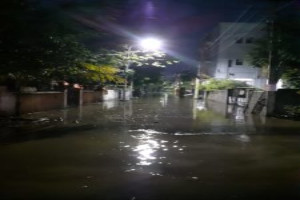
File photo of floods in Chennai
New Delhi: The Government of India and the Asian Development Bank (ADB) today signed a $251 million loan for climate-resilient, integrated urban flood protection and management in the Chennai-Kosasthalaiyar basin to strengthen resilience of Chennai city to floods.
Rajat Kumar Mishra, Additional Secretary, Department of Economic Affairs in the Ministry of Finance signed for the Government of India, and Takeo Konishi, Country Director of ADB’s India Resident Mission signed the agreement.
Mishra said that the project interventions will help reduce the vulnerability of Chennai–Kosasthalaiyar basin residents to frequent floods, which have in recent years destroyed property and livelihoods. He said that building disaster-resilient infrastructure would help communities cope with intensifying rainfall, a higher sea level rise, and a storm surge caused by cyclones and protect lives, economy and the environment.
“The project will build flood protection infrastructure as well as strengthen capacity of the Greater Chennai Corporation and communities for better preparedness planning to transform Chennai into a more livable city,” Konishi said. “The innovative designs and interventions for climate-resilient flood management promoted by the project along with integrated urban planning and enhanced municipal resource mobilization can be widely replicated for other Indian cities that are vulnerable to climate and disaster risks,” he added.
Chennai’s rapid urbanization has encroached on the city’s natural landscape, reducing water retention capacity which make the city vulnerable to widespread flooding. The project will establish climate-resilient urban flood protection infrastructure. It will construct 588 kilometers (km) of new storm-water drains, rehabilitate or replace 175 km of storm-water drains, improve 11 km stretches in the Ambattur, Ariyallur, Kadappakkam, and Korattur channels to enhance water-carrying capacity, and upgrade a storm-water pumping station and construct a new one. It will also construct 23,000 catch pits in roadside drains to recharge the groundwater aquifer and rehabilitate four disaster relief camps.
Flood preparedness will be strengthened by developing guidelines to integrate flood hazard zoning into spatial and land use planning, implementing a flood citizen observatory for real-time information in flood areas, and creating a manual for green infrastructure design, including rainwater harvesting. The project also aims to enhance stakeholders’ involvement, including proactive participation of women, in flood preparedness by raising community knowledge and awareness of flood risks and impacts and its relationship with solid waste management, sewerage, and protection of water bodies.
Technical staff of the Greater Chennai Corporation (GCC) will also be trained on planning and design of storm water drainage systems and management of solid waste and flood risks. The project will develop a plan to ensure sustainable operation and maintenance of storm-water drainage systems. The project will also support the GCC to develop a roadmap to strengthen municipal resource mobilization for delivering sustainable and quality municipal services to the citizens.
– global bihari bureau




